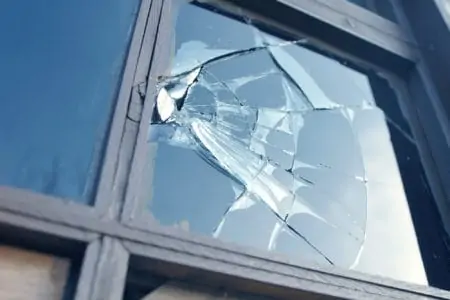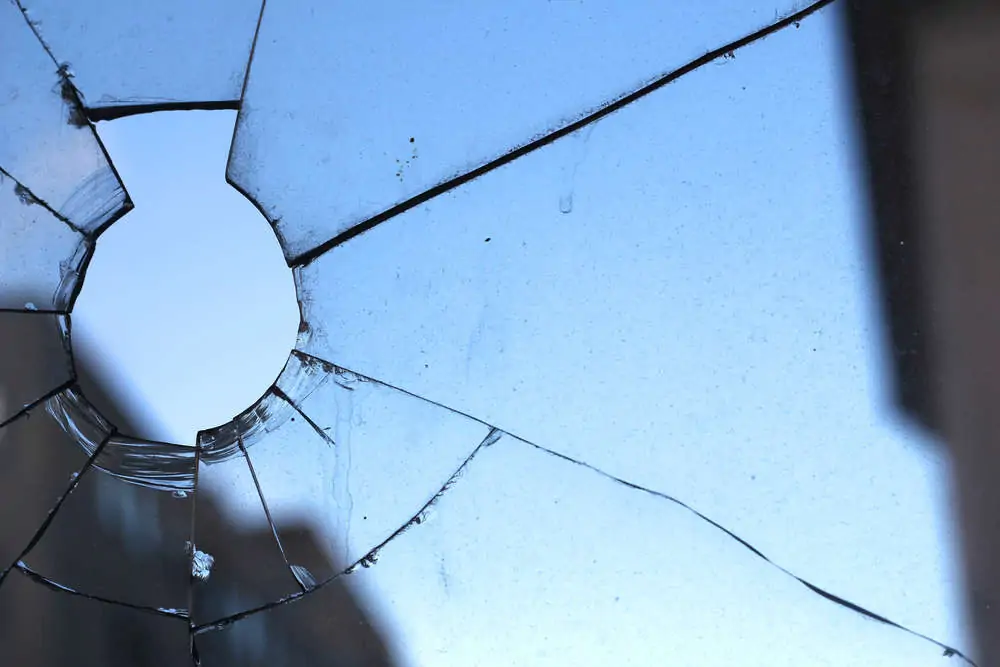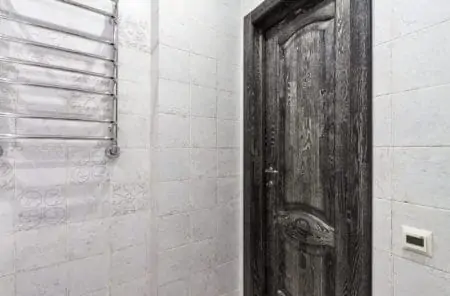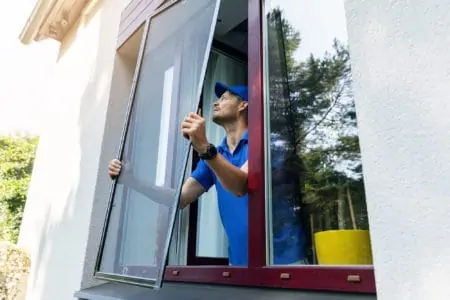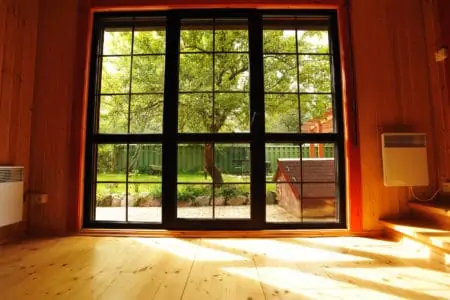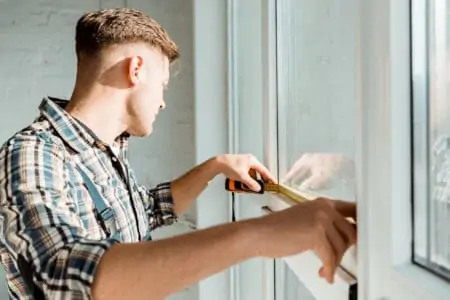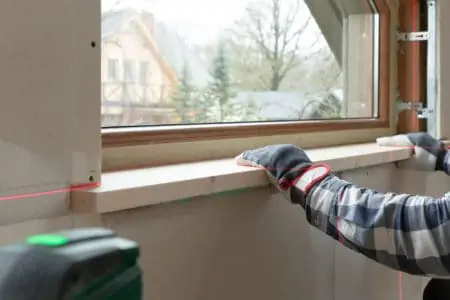There are several reasons why your window is cracked. It could be a loose stone from a lawnmower, kids playing ball, and flying objects in high winds. All are possible causes, but it can be challenging to stop a crack from spreading once a crack appears.
Luckily, repairs are possible with our definitive guide to how to fix a cracked window.
Key Takeaways
- Stop window crack from spreading with masking tape or nail polish.
- Use epoxy resin for a strong and lasting repair on single-pane windows.
- Clean the window thoroughly before applying epoxy resin and allow it to cure for 24 hours.
- Fixing cracked glass can be dangerous, so wear protective gloves and work in a well-ventilated area.
Can You Fix Cracked Glass?
Most glass can be fixed as long as the cracks are no larger than an inch in diameter and 12 inches long. The secret is to repair the glass immediately before the damage spreads. Also, cracked glass is weak, making it a safety risk if left unattended.
Only single-pane glass is repairable. You cannot repair double-paned windows if both panes have cracks or holes. DIY repairing automotive glass is a challenge, but professionals can easily fix the glass.
Round impact cracks are easier to repair because the gap is shallower. Deep impacts from sharp objects cause more lasting damage, but they can still be fixed with a little knowledge.
It’s worth noting that some repairs will still be visible. Phone and tablet screens are fixable, but you will still notice the damage. So, what else can you fix, and more importantly, what can’t you repair?
Can be Fixed
- Single-pane windows.
- Mirror.
- Glass tiles.
- Sidelites.
- Picture glass.
- Some kitchen glassware.
Can’t be Fixed
- Double-pane windows.
- Microwave glass.
- Oven glass.
- Shower and tub glass.
Common Causes of Broken Glass
The glass in your home is a soda/lime mix containing sodium carbonate, magnesia, and alumina. So compared to other building materials, glass is fragile. It means your window glass is durable but extremely brittle, and when it smashes, it creates dangerous shards.
Knowing why windows break is essential if you want to avoid costly repairs. But what are the most common reasons why glass breaks?
Stress Cracks
Window glass is on the front line in the battle of extreme temperatures. As the mercury drops, the glass competes with the cold air outside and the warm inside. This places it under severe stress, which could result in cracking.
The cracks usually start small in the corners of the pane, so they can be hard to spot. Over time, they spread as the glass weakens. If this happens, it can be tough to remedy.
Impact Cracks
Impact cracks are often challenging to repair because they leave larger holes. So, the next time the kids play ball in the yard, tell them to stay away from the windows.
If the gap is over an inch in diameter or 12 inches in length, it’s not even worth trying to repair the windows. Make your life easier and source new glass.
The next time you mow the lawn, check the grass for small stones before you start. The last thing you would want is for that pebble to crash through your window like a missile.
Chips Become Cracks
Keep an eye out for small chips on the surface of your glass. Chips occur through impact or stress fractures due to extreme weather. They weaken the material, which could lead to cracks.
Keep In Mind
Chipped windows are the easiest to repair if caught early, but it gets more challenging once they spread.
How to Stop a Window Crack from Spreading
Once you notice a crack in your windowpane, the race is on to prevent it from spreading. The more the glass weakens, the harder it is to repair. So, what are the tips and tricks to remedy the situation?
Safety First
Fixing cracked glass is dangerous, so wear protective gloves to avoid injury.
Masking Tape
Fixing tape over cracked glass is the easiest way to perform a temporary repair. Place the tape over the damaged glass and press it in place to add structural rigidity. Choose clear packing or sticky tape if you don’t want to obscure your view.
Using tape is not the most aesthetically pleasing to look at, but it is a quick fix for hairline cracks in the short term.
Nail Polish or Glue
Clear nail polish or glue is an excellent way to seal cracks. Pour a small amount into the gap and let it set. Then repeat the process until the gap is filled.
Epoxy Resin
Epoxy resin is by far the best sealant for repairing broken glass, but it is also the most time-consuming. Epoxy is a thermosetting polymer that delivers the strongest results when cured. It also dries crystal clear, so you can still see out of the window.
This method starts with thoroughly cleaning the window. Then the epoxy and hardener are mixed in equal 1:1 parts. You can pour it into a cup or mix it on a paper plate. The epoxy solution is then spread over the glass, ensuring that it gets into every gap.
Once cured, you may need to repeat the process and then scrape away any hardened excess resin. After cleaning, the window will look as good as new.
How to Fix a Cracked Glass Window
So, you have a cracked windowpane courtesy of a chance encounter with a stone and a lawnmower, and it’s time to repair it. You could use a window repair kit like this Rain Windshield Repair Kit.
It isn’t exclusively for use on your car windshield and can also work on the windows in your home. It comes with resin and is cheaper than paying for a separate epoxy solution.
However, windshield repair kits are better for minor repairs rather than entire window panes.
To get a lasting result without replacing it, opt for epoxy resin. It dries rock hard and crystal clear, and even masks the original crack.
But before you start, you’ll need some tools and materials.
What You’ll Need
- Dish soap.
- Two-part epoxy.
- Razorblade.
- Glass cleaner.
- Toothpicks.
- Cotton rags.
- Putty knife.
- Acetone.
- Paper plates.
- Glass cleaner.
1. Clean the Glass
Wet a cloth and add a couple of drops of dish soap. Wipe the surface of the glass to remove any debris or loose particles of glass.
You’ll also want to remove oil and fingerprints. Wipe the surface with a dry cloth to remove the dish soap residue and leave it to dry.
Take Note
When working with broken glass, wear safety gloves at all times.
2. Mix the Two-Part Epoxy
Grab your paper plate and move to a well-ventilated area. Mix the epoxy and hardener in equal measures onto the paper plate and stir them together using a toothpick. Do this for about 20 seconds, and be ready to start using the epoxy immediately before it hardens.
The epoxy will only stay pliable for about 10 minutes before it begins to set. As it dries, it thickens, making it a challenge to get the epoxy into the cracks. This Gorilla Two-Part Syringe Epoxy is an excellent example.
3. Apply the Epoxy
Press the epoxy into the cracks with the putty knife and work the adhesive back and forth over the damaged area. Now let the epoxy cure for 10 minutes.
4. Remove the Excess Epoxy
Use a razor blade to cut away the excess hardened epoxy. Now rub the glass clean with a rag soaked in acetone, like this Pronto Nail Polish Remover, to remove any resin that sits above the surface of the glass. Now, wait 24 hours while the resin cures.
5. Clean the Glass
Pour some glass cleaner, like this Seventh Generation Biodegradable Formula, onto a clean rag and wipe down the surface of the window until it is sparkly clean and as new.
How to Make Cracks Disappear
Once you’ve treated that crack, if it is still visible, you can make it disappear from view. Here’s how to do it:
Opaque Window Covering
Using a frosted window covering will hide the crack. The trouble is, it also obscures your view outside. That’s not a problem if you are sticking it to a window in an obscure position, like a bathroom.
The window sticker doesn’t have to be frosted; you can buy several patterns, from fake stained glass to rainbow effects.
This is only ever going to be a short-term fix because stick-on window coverings are temporary and need replacing periodically.
FAQs
The Final Say
Broken window panes are a real pain (did you see what we did there?), but they are repairable. Epoxy resin is by far the best way to fix cracks, period! All it takes is a little patience and the right materials.
Just remember that if the crack is too large, you could be wasting your time even trying. Bite the bullet and buy a new window.
